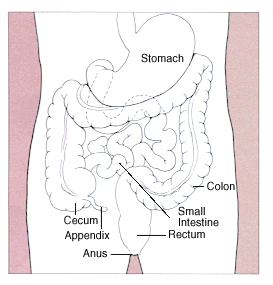Gastritis (patient information): Difference between revisions
| Line 103: | Line 103: | ||
==Prevention of Gastritis== | ==Prevention of Gastritis== | ||
Avoid long-term use of irritants (such as aspirin, anti-inflammatory drugs, or alcohol). | Avoid long-term use of irritants (such as [[aspirin]], anti-inflammatory drugs, or alcohol). | ||
==What to expect (Outlook/Prognosis)== | ==What to expect (Outlook/Prognosis)== | ||
Revision as of 17:52, 26 February 2010
For the WikiDoc page for this topic, click here
Editor-in-Chief: Meagan E. Doherty; Jinhui Wu, MD
Please Join in Editing This Page and Apply to be an Editor-In-Chief for this topic: There can be one or more than one Editor-In-Chief. You may also apply to be an Associate Editor-In-Chief of one of the subtopics below. Please mail us [1] to indicate your interest in serving either as an Editor-In-Chief of the entire topic or as an Associate Editor-In-Chief for a subtopic. Please be sure to attach your CV and or biographical sketch.
What is Gastritis?

Gastritis is an inflammation (irritation and swelling) of the lining of the stomach.
There are two types of Gastritis:
- Acute gastritis: a sudden inflammation of the lining of the stomach.
- Chronic gastritis: inflammation of the lining of the stomach that persists for a long time.
What are the symptoms of Gastritis?
- Abdominal pain
- Abdominal indigestion
- Dark stools
- Loss of appetite
- Nausea
- Vomiting
- Vomiting blood or coffee-ground like material
Who is at risk for Gastritis?
Risk factors for Gastritis include:
- Consuming excessive amounts of alcohol
- Consuming excessive amounts of caffeine
- Taking medications such as aspirin or other nonsteroidal anti-inflammatory drugs (NSAIDs)
- Smoking
- Stress
- Having an infection with bacteria such as Helicobacter pylori (H. pylori)
- Having a major surgery
- Traumatic injury, burns, or severe infections
- Having certain diseases, such as pernicious anemia, autoimmune disorders, and chronic bile reflux
How to know you have Gastritis (Diagnosis)?
Gastritis is diagnosed through one or more medical tests:
- Upper gastrointestinal endoscopy and biopsy The doctor eases an endoscope, a thin tube containing a tiny camera, through your mouth (or occasionally nose) and down into your stomach to look at the stomach lining. The doctor will check for inflammation and may remove a tiny sample of tissue for tests. This procedure to remove a tissue sample is called a biopsy.
- Blood test. The doctor may check your red blood cell count to see whether you have anemia, which means that you do not have enough red blood cells. Anemia can be caused by bleeding from the stomach.
- Stool test. This test checks for the presence of blood in your stool, a sign of bleeding. Stool test may also be used to detect the presence of H. pylori in the digestive tract.
When to seek urgent medical care
Call for an appointment with your health care provider if symptoms of gastritis persist longer than 2 or 3 days. Call your health care provider if you vomit blood or have bloody stools.
Treatment options
Treatment depends on the specific cause. Some of the causes will disappear over time.
- Medications known to cause gastritis should be discontinued.
- Medications to neutralize stomach acid or decrease its production will usually eliminate the symptoms and promote healing.
- Antibiotics are used to treat chronic gastritis caused by infection with Helicobacter pylori.
- Gastritis caused by pernicious anemia is treated with vitamin B12.
- Gastritis due to stress is best treated by prevention. Medications to decrease gastric acid production such as proton pump inhibitors (PPI) should be given to stressed hospital patients.
Diseases with similar symptoms
- Alcoholic gastropathy
- Aortic aneurysm (ruptured)
- Bacterial infections
- Burns
- Candida
- Corrosive gastritis
- Crohn's Disease
- Cytomegalovirus (CMV) in HIV
- Diseases of the biliary system
- Drugs
- Eosinophilic Gastritis
- Esophageal varices
- Functional dyspepsia
- Gastric carcinoma
- Gastritis in pernicious anemia
- Gastroduodenal ulcer
- Helicobacter pylori
- Intoxication
- Liver failure
- Lymphocytic gastritis
- Mallory-Weiss Tear
- Menetrier's Disease
- Pancreas carcinoma
- Pancreatitis
- Peptic ulcer
- Perforated ulcer
- Radiation
- Reflux esophagitis
- Renal Failure
- Respiratory failure
- Sarcoidosis
- Sepsis
- Shock
- Surgery
- Syphilis
- Trauma
- Tuberculosis
- Volvulus
- Zollinger-Ellison Syndrome
Where to find medical care for yourdisease
Directions to Hospitals Treating Gastritis
Prevention of Gastritis
Avoid long-term use of irritants (such as aspirin, anti-inflammatory drugs, or alcohol).
What to expect (Outlook/Prognosis)
Most gastritis improves rapidly with treatment.
Sources
- http://digestive.niddk.nih.gov/ddiseases/pubs/gastritis/
- http://www.nlm.nih.gov/medlineplus/ency/article/000240.htm